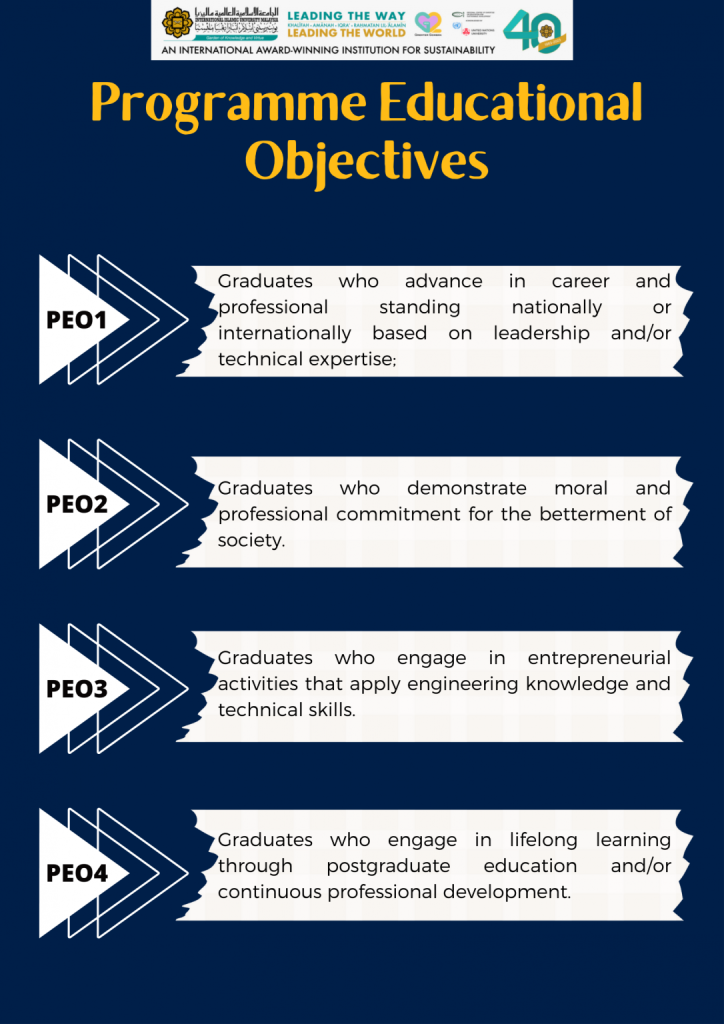Under the Bachelor of Civil Engineering with Honours programme, students are required to complete a minimum of 139 credit hours over eight (8) semesters. The curriculum is carefully designed and delivered through effective teaching, learning, and assessment strategies to ensure the attainment of the programme’s twelve (12) Programme Outcomes (POs), equipping graduates with the knowledge, skills, and professional values essential for the civil engineering profession.
The Student Academic Performance Evaluation (Undergraduate) Regulation 2021 (SAPER 2021) can be found at the website using the following link.
Outcome Based Education (OBE)
OBE focuses on the students achieving outcomes (required attributes, skills, qualities) after undergoing the learning process through the OBE curriculum. OBE comprises of four (4) major components which cover 1) curriculum design, 2) teaching and learning methods, 3) assessments, and 4) continual quality improvement (CQI) and monitoring.
The end goal is clearly stated as Programme Learning Outcomes (PLOs) and Course Learning Outcomes (CLOs). Outcomes describe the knowledge, skills, and attitudes students should demonstrate upon graduation.
The Engineering Accreditation Council (EAC) Manual is the official guideline used in Malaysia to ensure that engineering programmes meet the required standards for accreditation under the Washington Accord. It is developed by the Engineering Accreditation Council Malaysia, a body under the Board of Engineers Malaysia (BEM) and is mandatory for all higher education institutions offering engineering degree programmes seeking EAC accreditation.
Program Outcomes (PO)
Programme Outcomes is the specific abilities graduates should demonstrate at the time of graduation. Currently, twelve (12) Standard EAC Programme Outcomes across all accredited engineering programmes in Malaysia applied the EAC Standard 2020.
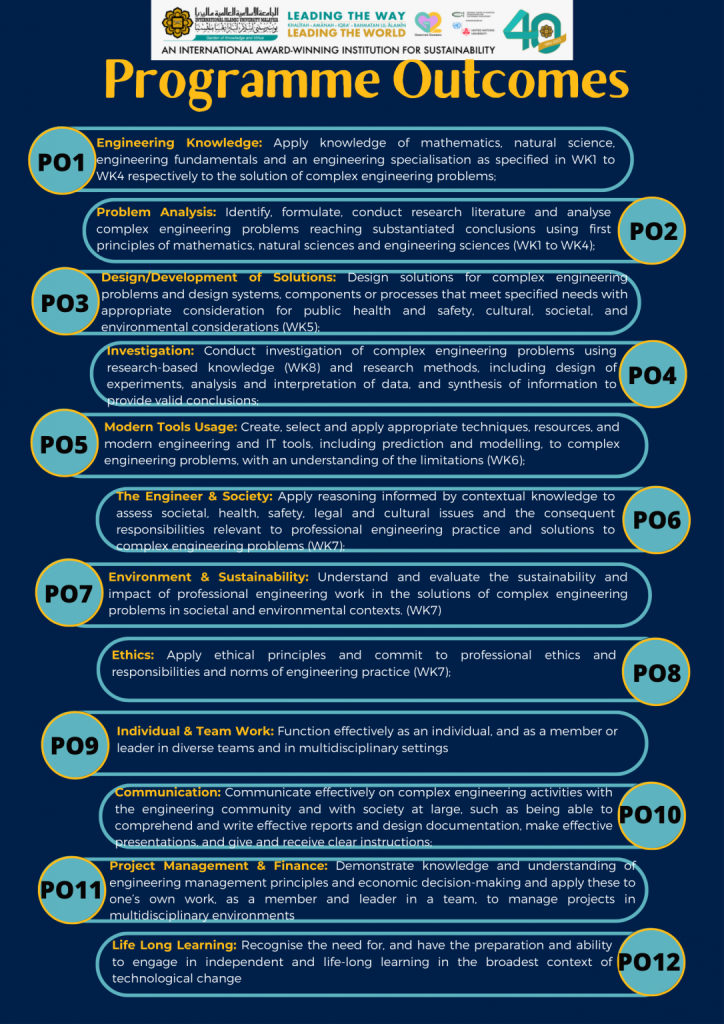
According to the Engineering Accreditation Council (EAC) Standard 2024, Malaysian engineering programmes are required to implement 11 Programme Outcomes, aligning with the Washington Accord graduate attributes. These 11 POs reflect the core competencies students must achieve by the time of graduation. This programme will apply the EAC Standard 2024 for our new curriculum 2026.
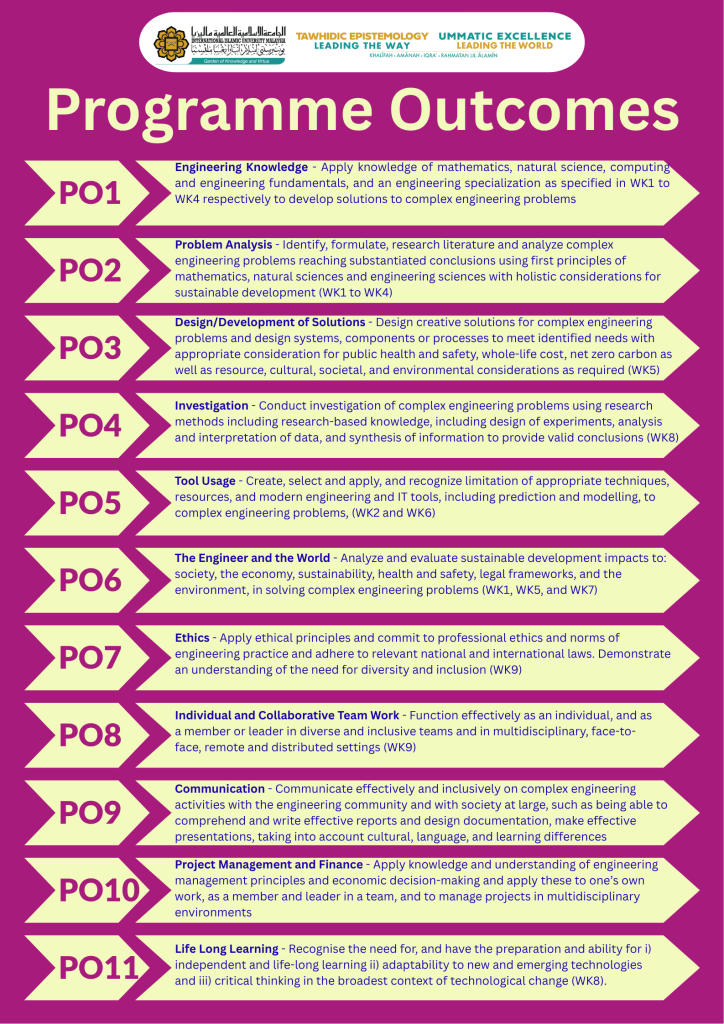
Program Educational Objectives (PEO)
MAPPING OF COURSES TO PROGRAMME OUTCOMES MATRIX (CURRICULUM REVISION 2015)
MAPPING OF COURSES TO PROGRAMME OUTCOMES MATRIX (CURRICULUM REVISION 2021)
Complex Engineering Problems (WP)
| ATTRIBUTE | Complex Engineering Problems have characteristic WP1 and some or all of WP2 to WP7 |
| Depth of Knowledge Required | WP1: Can’t be resolved without in-depth engineering knowledge at the level of one or more of WK3, WK4, WK5, WK6 or WK8 which allows a fundamentals-based, first principles analytical approach |
| Range of Conflicting Requirements | WP2: Involve wide-ranging or conflicting technical, engineering and other issues |
| Depth of Analysis Required | WP3: Have no obvious solution and require abstract thinking, originality in analysis to formulate suitable models |
| Familiarity of Issues | WP4: Involve infrequently encountered issues |
| Extent of Applicable Codes | WP5: Are outside problems encompassed by standards and codes of practice for professional engineering |
| Extent of Stakeholder Involvement and Conflicting Requirements | WP6: Involve diverse groups of stakeholders with widely varying needs |
| Interdependence | WP 7: Are high level problems including many component parts or sub-problems |
| In addition, in the context of the Professional Competencies | |
| Consequences | EP1: Have significant consequences in a range of contexts |
| Judgement | EP2: Require judgement in decision making. |
Complex Engineering Activities
| ATTRIBUTE | Complex Activities |
| Preamble | Complex activities means (engineering) activities or projects that have some or all of the following characteristics: |
| Range of resources | EA1: Involve the use of diverse resources (and for this purpose resources includes people, money, equipment, materials, information and technologies) |
| Level of interactions | EA2: Require resolution of significant problems arising from interactions between wide-ranging or conflicting technical, engineering or other issues |
| Innovation | EA3: Involve creative use of engineering principles and research-based knowledge in novel ways. |
| Consequences to society and the environment | EA4: Have significant consequences in a range of contexts, characterized by difficulty of prediction and mitigation |
| Familiarity | EA5: Can extend beyond previous experiences by applying principles-based approaches |
Study Plan Bachelor of Civil Engineering with Honours
Study Plan for Cohort 202

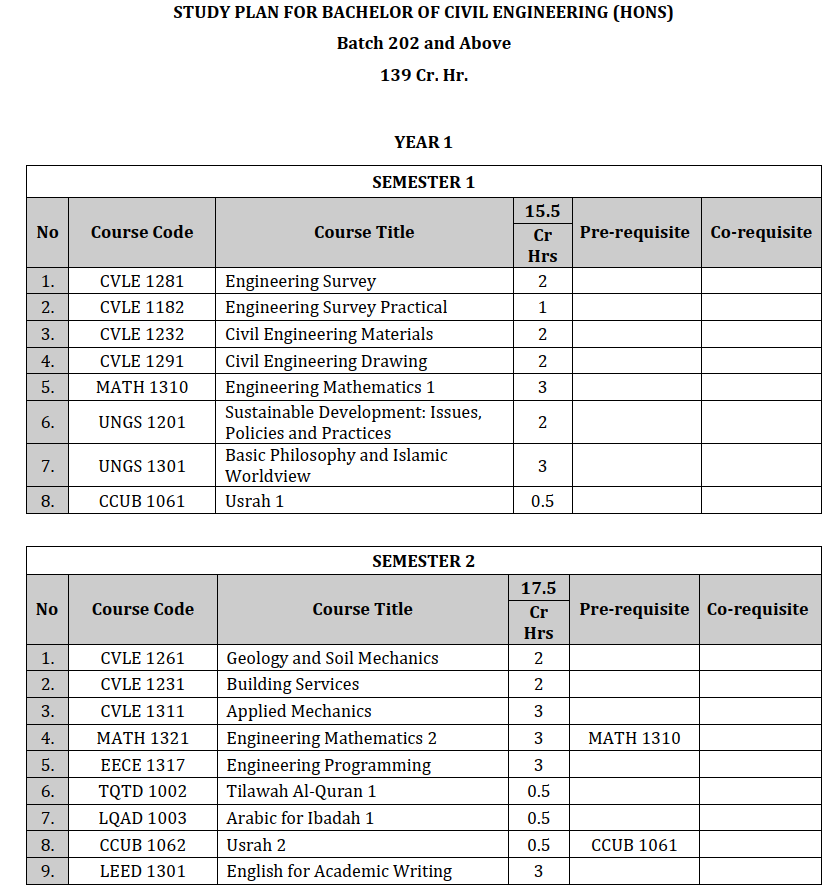
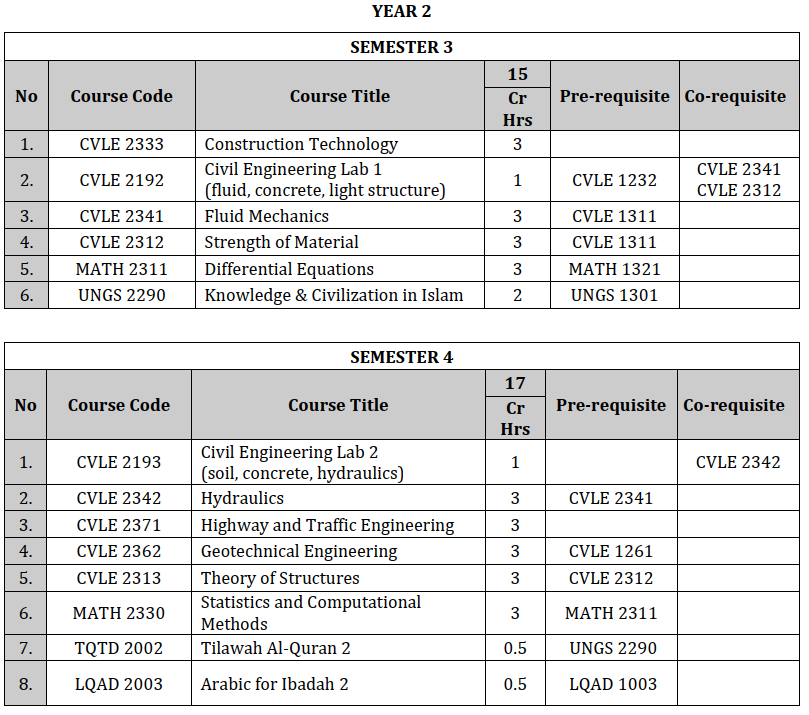
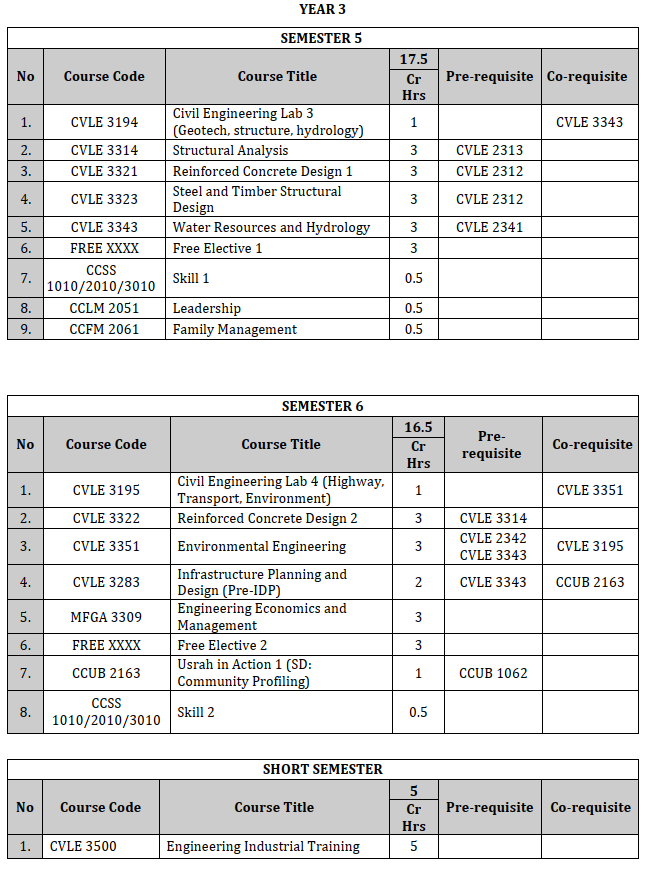
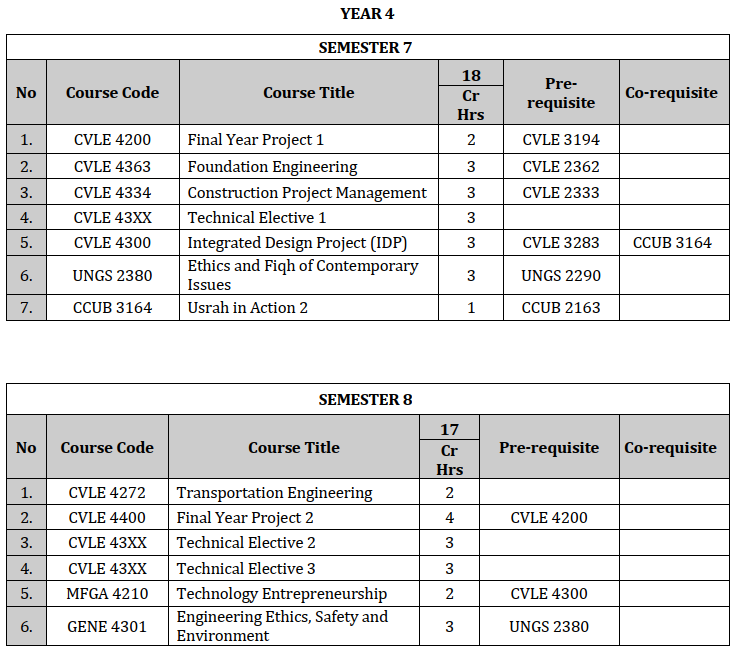
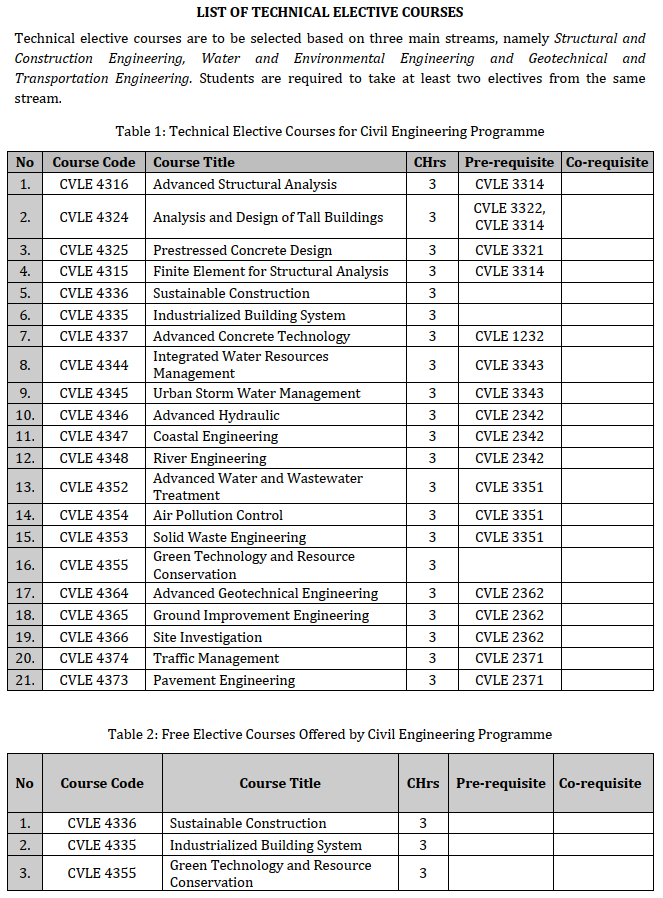
Study Plan for Cohort 201

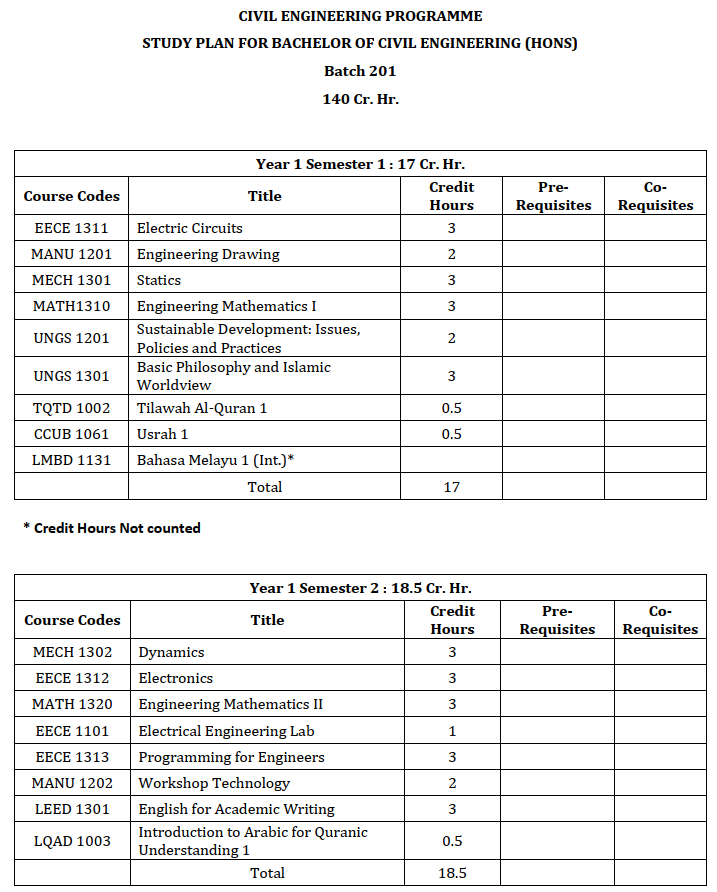
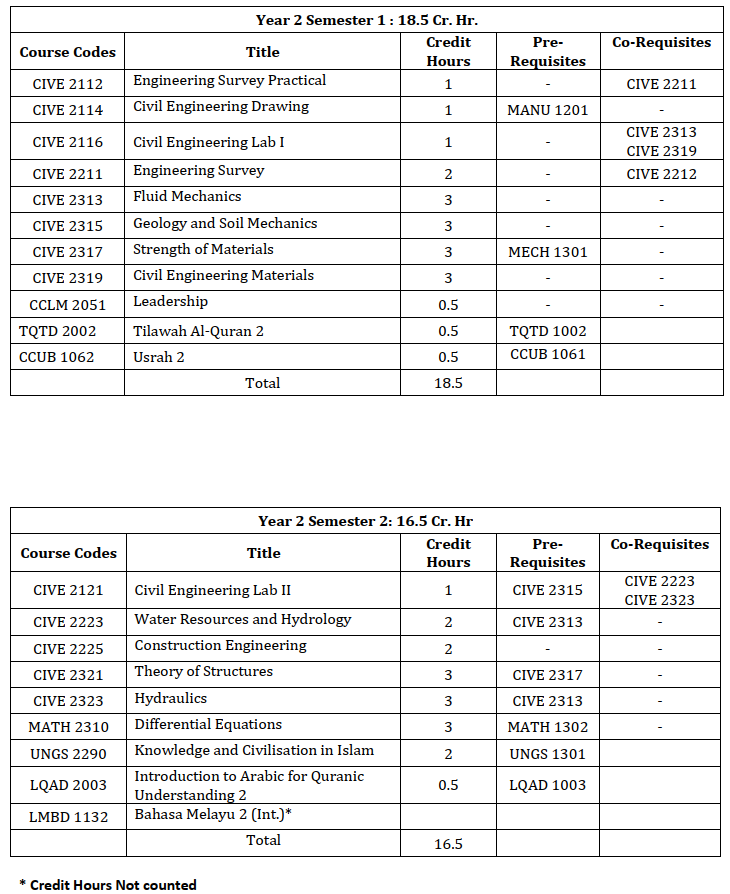
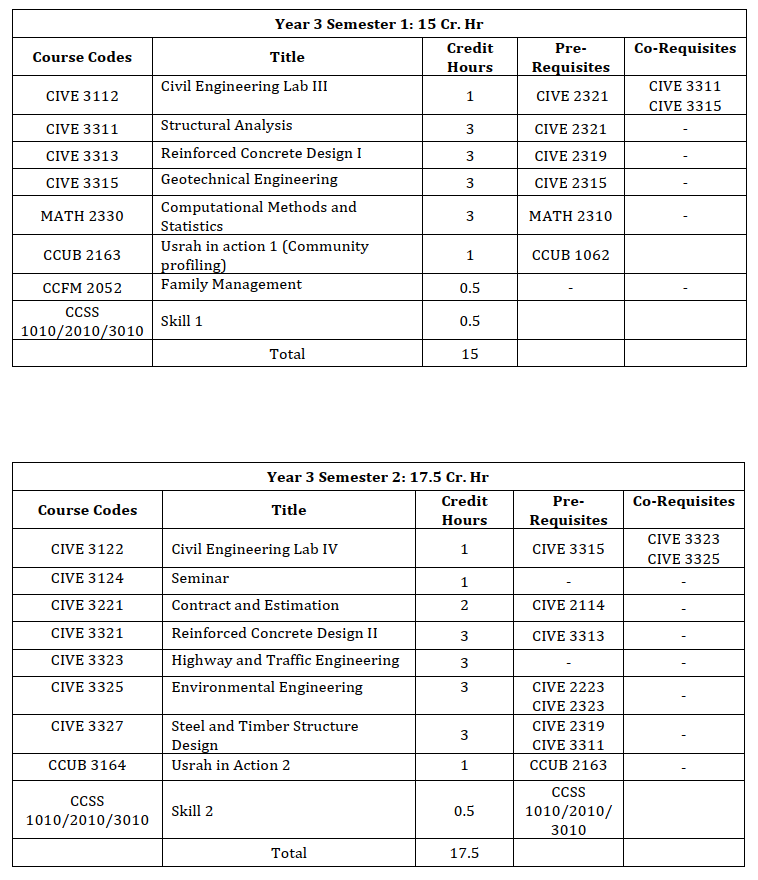
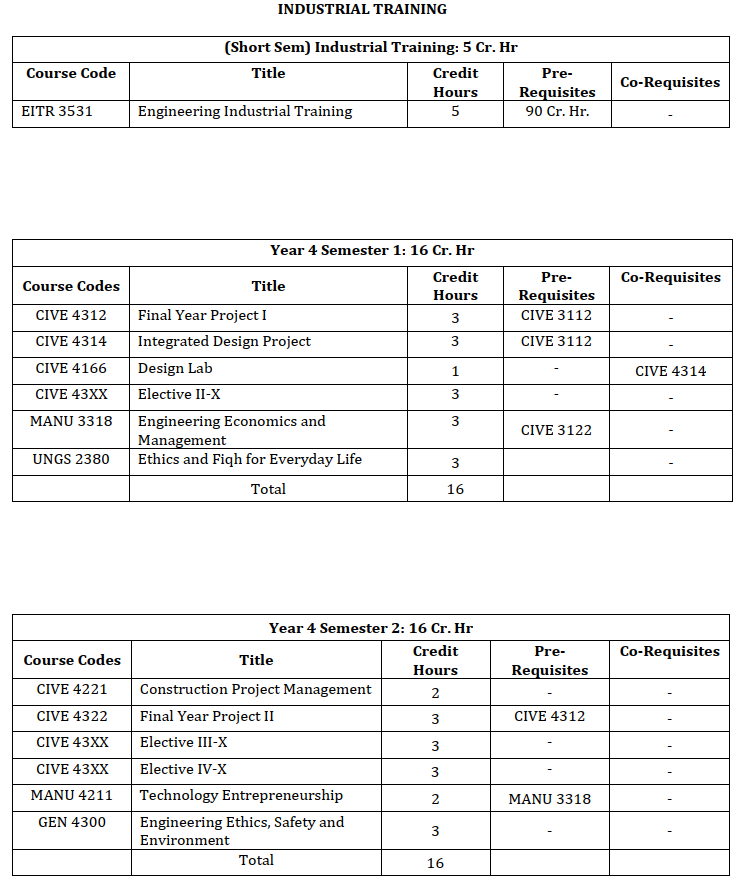
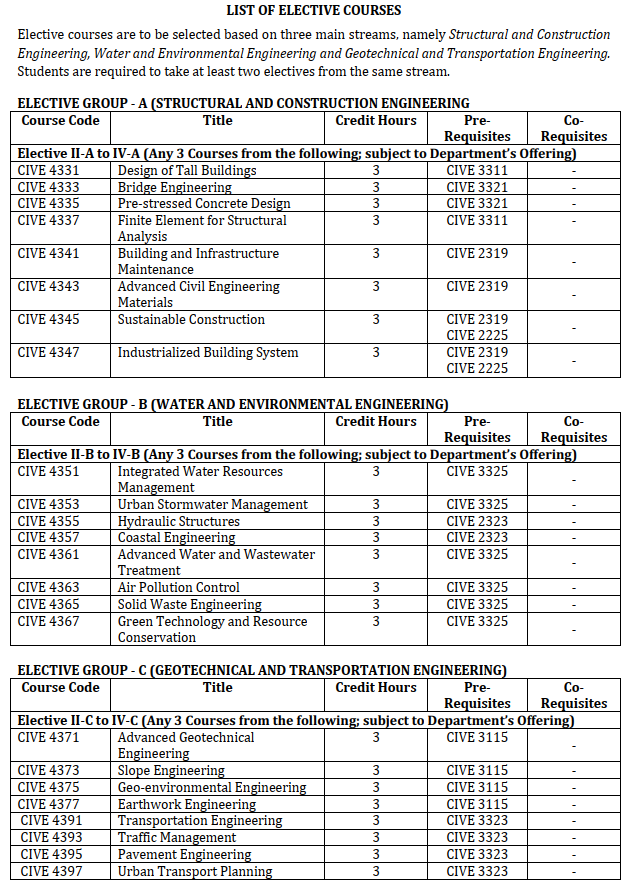
Study Plan for Cohort 171

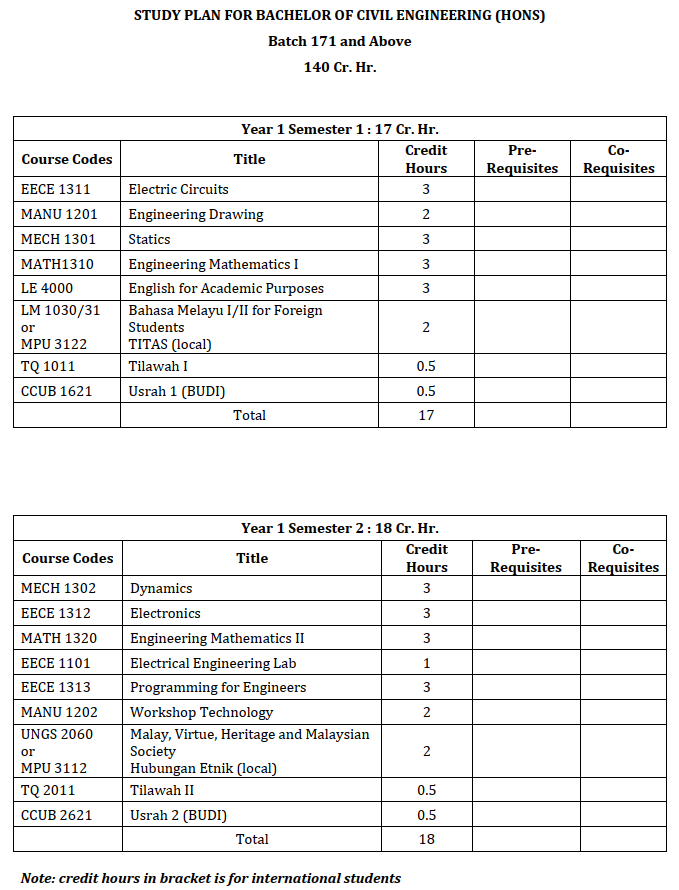
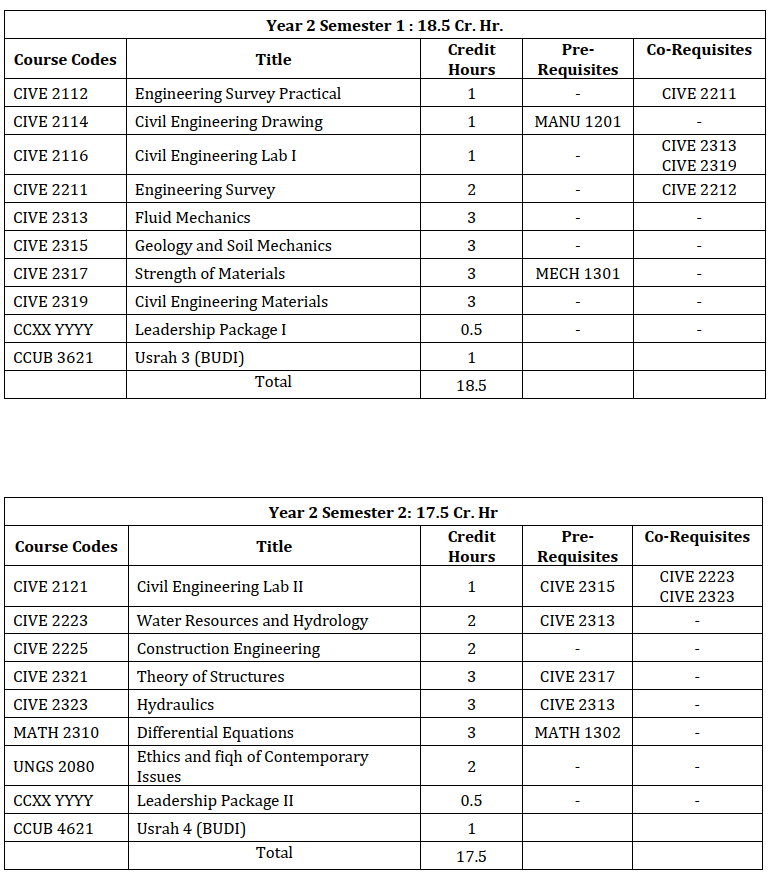
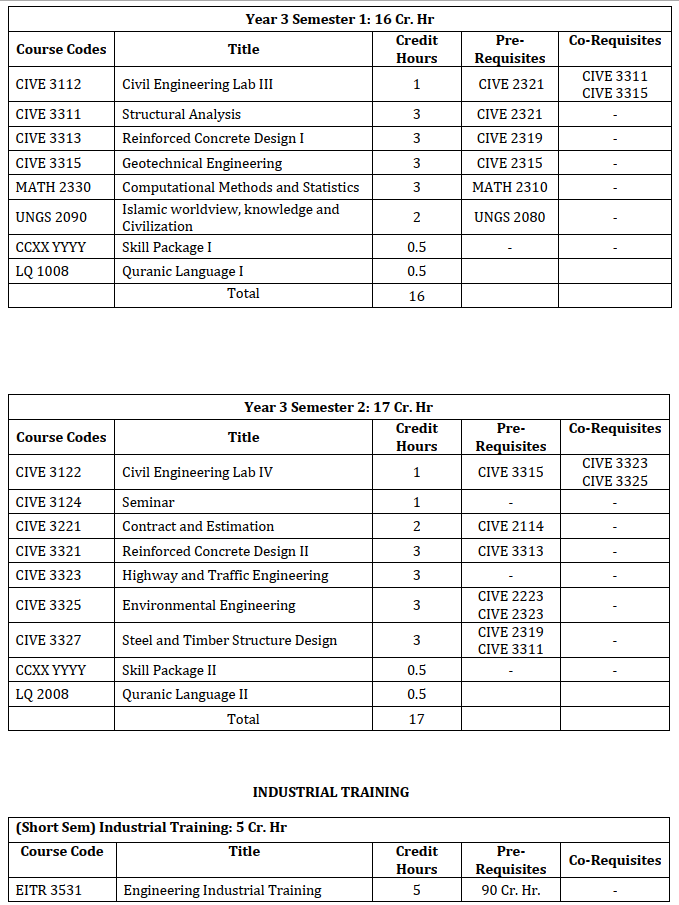
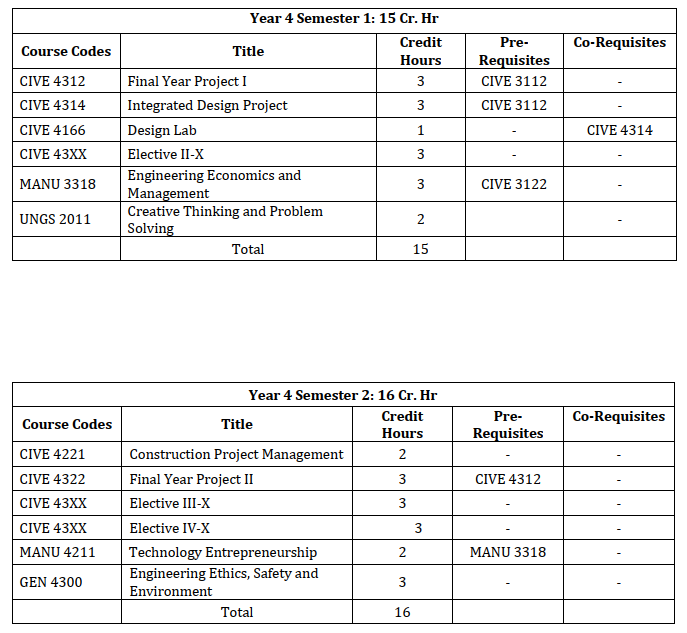
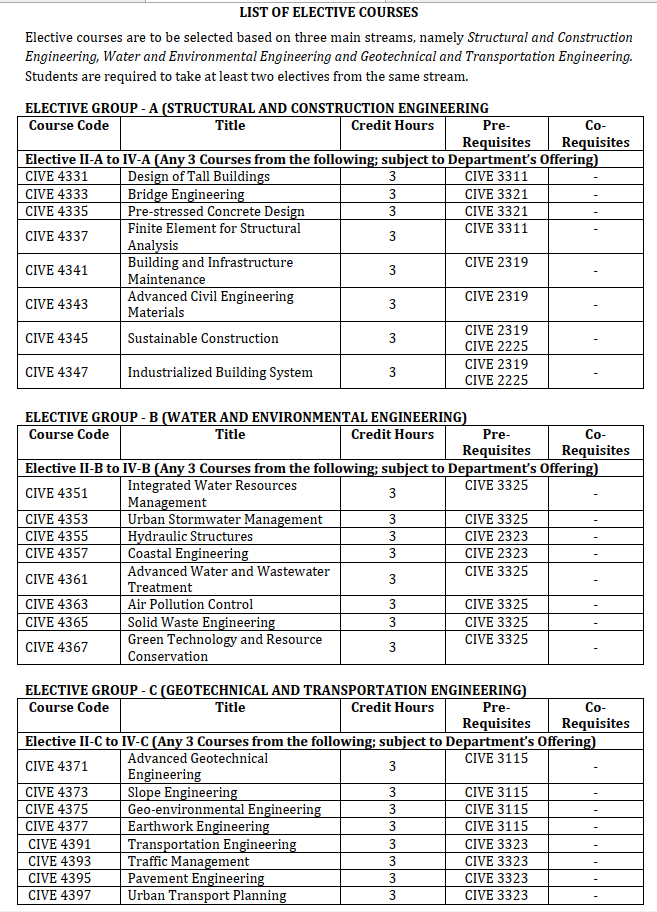
Study Plan for Cohort 151-156

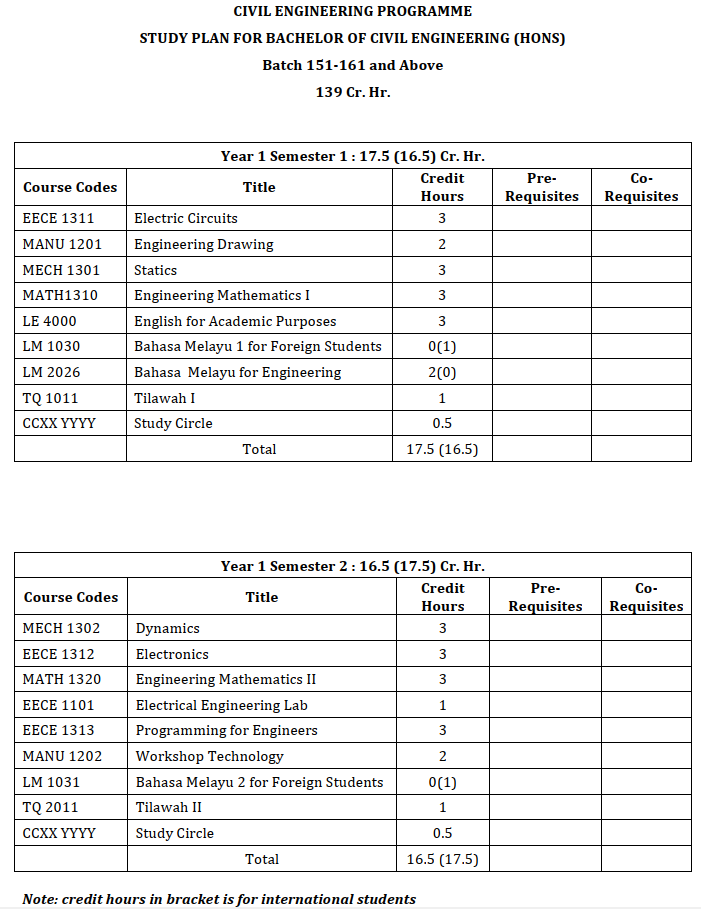

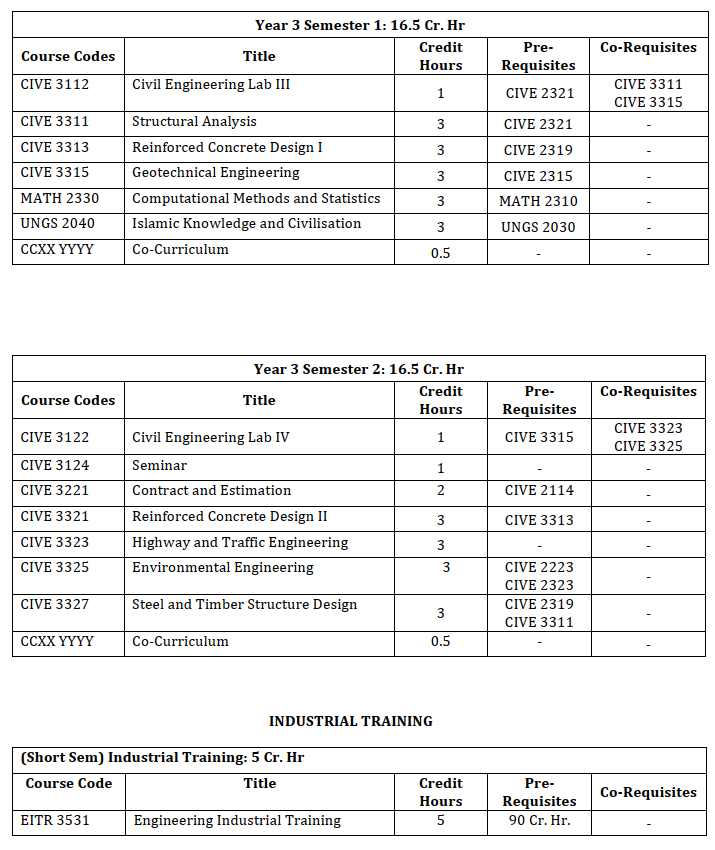
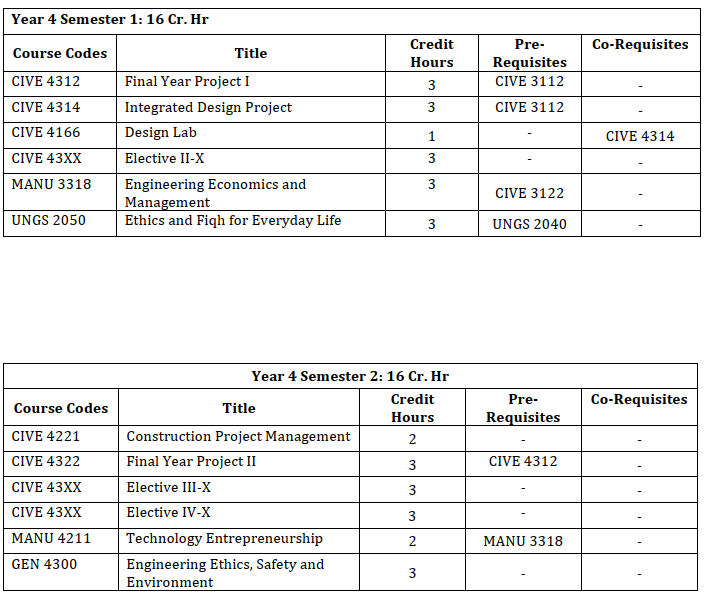
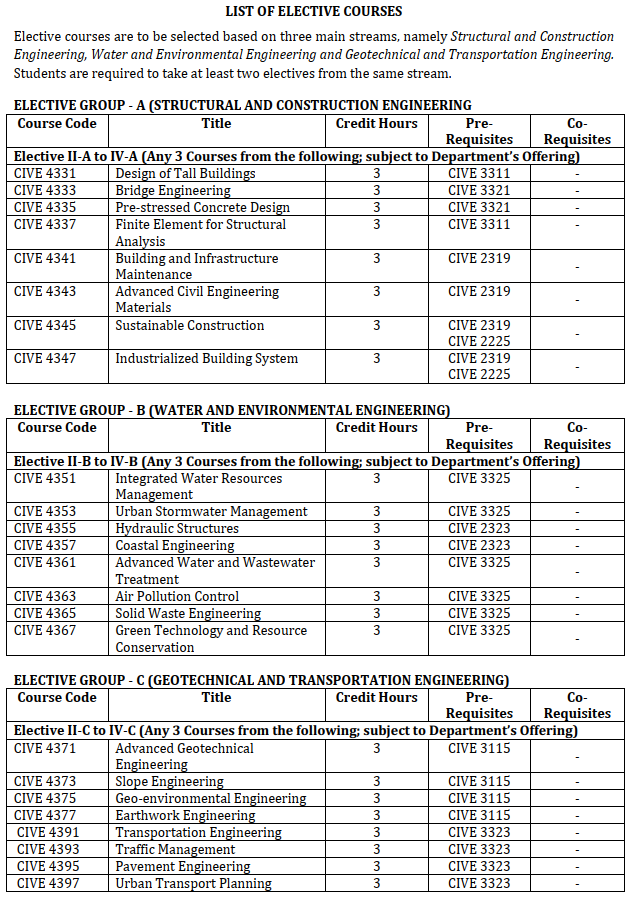
IIUM Grading System
| Percentage Score | Letter Grade | Quality Point Equivalent | Hours Credited | Hours Earned |
| 80-100 | A | 4.00 | Yes | Yes |
| 75-79 | A- | 3.67 | Yes | Yes |
| 70-74 | B+ | 3.33 | Yes | Yes |
| 65-69 | B | 3.00 | Yes | Yes |
| 60-64 | B- | 2.67 | Yes | Yes |
| 55-59 | C+ | 2.33 | Yes | Yes |
| 50-54 | C | 2.00 | Yes | Yes |
| 45-49 | D | 1.67 | Yes | No |
| 40-44 | D- | 1.33 | Yes | No |
| 35-39 | E | 1.00 | Yes | No |
| 0-34 | F | 0.00 | Yes | No |
| Grade | Interpretation | Hours Credited | Hours Earned |
| PA/FA | Practical training/P/F Option course | Yes | Yes |
| PR | Pass on Resit | Yes | Yes |
| FR | Fail on Resit | Yes | No |
| I | Incomplete | No | No |
| IP | Course in Progress | No | No |
| W | Withdrawal with Special Permission | No | No |
| AU | Audit | No | No |
| Y | Barred from End-of-Semester Examination | Yes | No |
| EX | Exempted | Yes | Yes |
You may access the grading system using this link.

